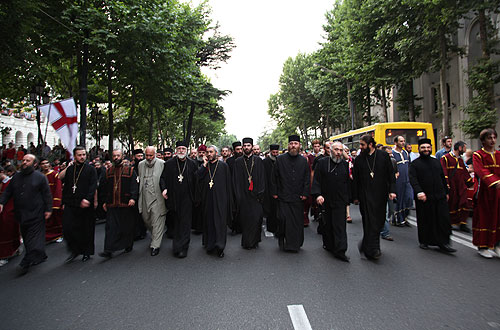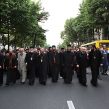
The Georgian Orthodox Church: Some Aspects of Its Rhetoric and Practice
Publication: Eurasia Daily Monitor Volume: 10 Issue: 70
By:

In trying to access the website of the Georgian Orthodox Church on Sunday, April 7, 2013, one would have ended up reading a message in Russian that said, “The owner of this account has suspended service” due to nonpayment (https://www.patriarchate.ge/). The fact that the official website of the Church is maintained by PeterHost a Russian firm, is just one more small example of the wide nexus of connections the Georgian Patriarchate shares with Moscow. Nevertheless, critics worry more about the increasingly active anti-Western campaign of the Church than its deepening ties with Russia; although, admittedly, these two trends are closely intertwined.
Brutally oppressed, closely controlled and largely marginalized during the period of Soviet rule in 1921–1991, the Georgian Orthodox Church played an important role in the nation’s pro-independence movement of the late 1980s. Expansion of the Church and an increase in its influence and material fortunes were byproducts of Georgia’s independence. The special status of the Church was underpinned by the Constitutional Agreement, the Concordat, signed in 2002.
The Georgian Church tops a list of societal and national institutions that are most trusted by the public. According to the latest opinion polls conducted by the International Republican Institute (IRI), 95 percent of Georgians trust the Church, followed by the army with 91 percent and police with 89 percent (https://geo.ambebi.ge//sazogadoeba/73674-instituciebis-mimarth-ndobis-reitingshi-eklesia-95-ith-kvlav-pirvel-adgilzea.html).
In the late 1980s and the early 1990s, the Georgian Orthodox Church was quite active in the international arena as it sought recognition by other churches abroad. The Patriarch of Constantinople recognized the autocephaly (autonomy) of the Georgian Church in 1990, and the personal efforts of Ilia II, Catholicos-Patriarch of All Georgia, played a crucial role in this historic event.
Paradoxically, over the years, the Church, now stronger and more powerful than ever in recent history, started curtailing its international engagement. As conservative clerics enjoying close connections with Russia tipped the balance of power in their favor, the Church quit its participation in international ecumenical organizations in 1997. Pope John Paul II, visiting Tbilisi in October 1999, was given a lukewarm reception by the Orthodox clergy. As self-isolation of the Church deepened, cases of harassment of Protestant missionaries and especially Jehovah’s Witnesses by xenophobic elements in the Church became widespread in the era of President Eduard Shevardnadze’s rule in the late 1990s and early 2000s, until the government of President Mikheil Saakashvili started to strictly prosecute cases of religious and anti-minority extremism (https://civil.ge/eng/article.php?id=5019).
Radical elements in the Patriarchate were allegedly behind the violent group called the Union of Orthodox Christian Parents that orchestrated fistfights and other unlawful actions against minority groups in 2010 and 2012 (https://civil.ge/eng/article.php?id=24775). After the parliament of Georgia passed an amendment allowing religious minority groups to be registered as legal entities under public law, radical priests helped organize protest rallies demanding the immediate annulment of the bill. The Church and political parties known for their pro-Russian orientation harshly condemned the new regulation, which was hailed by influential international human rights organizations and Georgia’s Western partners as an important democratic achievement (https://civil.ge/eng/article.php?id=23728).
Patriarch Ilia II, arguably more moderate than other hierarchs in the Holy Synod of the Georgian Patriarchate, actually called on parents on October 3, 2010, to avoid educating their children abroad. “So we should refrain very much from sending young people, especially children, abroad. This practice in most cases will harm the child,” the head of the Georgian Church declared (https://civil.ge/eng/article.php?id=22722).
Yet another paradox of the Georgian reality was the fact that the Orthodox Church’s self-imposed isolation coincided with the Georgian state’s increased international engagement. In addition to Saakashvili’s pro-North Atlantic Treaty Organization (NATO) and pro-European Union policies, the president put emphasis, notably, on Western education (https://www.civil.ge/eng/article.php?id=22601; https://eastofcenter.tol.org/2012/02/georgia-saakashvili-the-corruption-slayer/). Hence, friction between Georgia’s pro-Western political elites and the Church was, if not natural, then at least not unusual.
The Church has ultimately become a highly politicized institution engaging itself in determining the “rights” and “wrongs” of Georgia’s domestic and foreign policy. One of the top hierarchs of the Church, Metropolitan Iobi, famously said that the Russian military intervention in August 2008 served as “heavenly pincers to block Georgia’s drive toward the West” (https://www.tavisupleba.mobi/a/24930756/full.html). Although Metropolitan Iobi champions the anti-Western cause within the Church, other hierarchs too use Sunday services for anti-liberal and anti-Western propaganda, which some civil rights activists have already dubbed “political proselytism.” Criticism of President Saakashvili and his United National Movement, who “go against tradition,” is a typical part of influential bishops’ political agenda (https://www.geworld.ge/ViewGE.php?G=2345&lang=ge). Others preach negative sentiments demonizing the West for its “moral corruption” and declare that “the West is a bigger enemy of Georgia than Russia is” (https://www.youtube.com/watch?v=Pe5K8SPFfhI).
Patriarch Ilia II, during his latest visit to Moscow (see EDM, April 4), called the “historical relations” between Georgia and Russia “brotherly and friendly,” adding that “someone probably envied our friendship and has artificially created enmity.” He then called President Putin of Russia “a wise man who will remedy the situation in Georgia […] and Georgia will be united again” (ExpressNews.ge, February 27). Political commentators in Tbilisi argue that the Patriarch meant Georgia’s Western partners when talking about someone who “envied” the “amity” between Georgia and Russia.
Throughout the centuries, Georgia’s geopolitically isolated Church maintained close ties with Europe and the Roman Catholic Church by embracing Christian solidarity rather than Orthodox separatism. Some of the eminent figures of the Church even converted to Catholicism in order to secure support for the Caucasus nation. During the brief period of Georgia’s independence in 1918–1921, the then-Patriarchs, Kyrion II and Ambrose, acted as pillars of Georgia’s independence and Europeanness. Self-isolation is a relatively new phenomenon for the Georgian Church. As Georgia aims at Euro-Atlantic integration, the Church’s isolationist practices and anti-Western rhetoric have the potential to negatively influence national public opinion and through it the country’s foreign policy aspirations.




